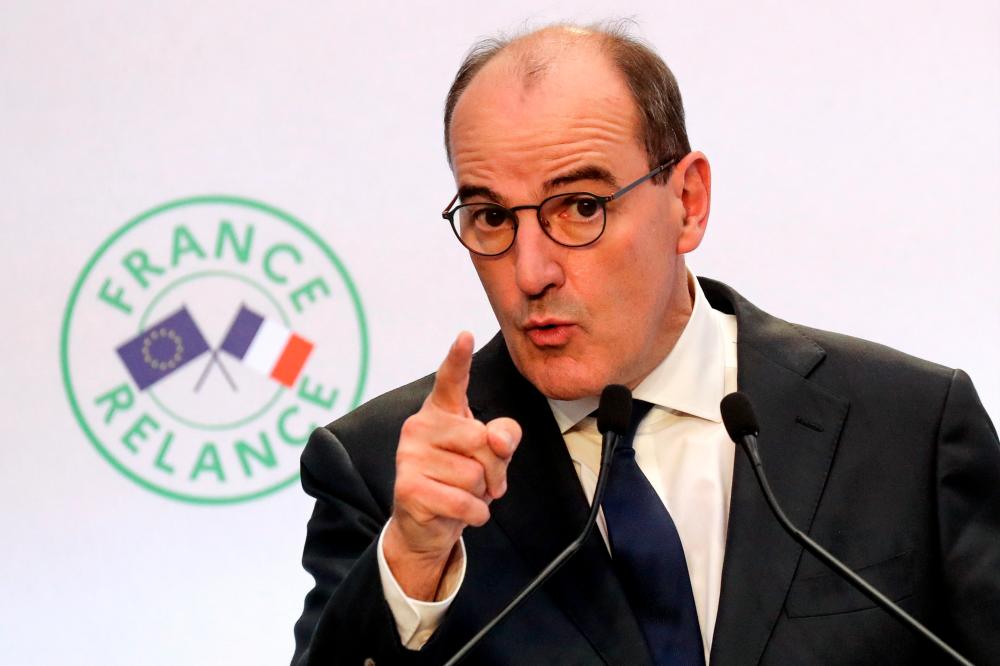PARIS: The French government said today that employment would be paramount as it unleashed a colossal spending plan for its virus-hit economy that has been hemorrhaging jobs.
Prime Minister Jean Castex promised 160,000 new jobs next year as part of a recovery plan worth €100 billion (RM490 billion), launched at a time when daily virus numbers in France are again on the rise.
"The ambition and size of this plan are historic," Castex told reporters after a cabinet meeting backing the stimulus package, which he said would help return the French economy to its pre-pandemic level by 2022.
The economy has experienced its worst downward spiral since 1945, with gross domestic product (GDP) plunging by 13.8% in the second quarter, after a drop of more than 5% in the first.
The government has said French companies could shed 800,000 positions this year.
"Our absolute priority is jobs," Castex said.
The budget boost – a combination of new spending and tax breaks, mostly for companies – comes on top of hundreds of billions already spent in an early pandemic response. Some €40 billion of the plan are to be covered by funds from a €750 billion European Union-wide deal agreed after much acrimony in July, Castex said.
France expects to present the programme next month to EU partners whose approval is needed to unblock the funds, European Affairs Minister Clement Beaune said.
Castex also vowed that the package would trigger no new taxes.
Kathrin Muehlbronner, a vice president at rating agency Moody's, said the "reasonably large" package at around 4.5% of GDP would not change the agency's view on France's fiscal strength or credit profile.
The new stimulus is "not just designed to dress the wounds from the crisis," Castex told Le Figaro daily in an interview before today's presentation.
"It lays the groundwork for the future," he said, echoing President Emmanuel Macron's assertion that its emphasis on decarbonising the economy, improving corporate competitiveness and creating jobs would usher in "the France of 2030."
Castex said France would now revive the job of high commissioner for planning, more than a decade after the position was ditched, to help the government identify strategic economic choices for the next decade. He said the job would go to Francois Bayrou, a respected centrist, former government minister and presidential candidate.
"The time for a relaunch has come," tweeted Macron.
Much of the new plan targets the corporate sector, which will get €35 billion worth of help.
But Philippe Martinez, head of the leftist CGT union, faulted the government for failing to extract promises from companies that they would safeguard jobs in return. "They gave money to Air France and Renault and for what? Job cuts. Is that what public money is for?" he said.
Some €30 billion are earmarked for greener policies.
Activists said this was too little, and called on the government to make companies commit to environmental targets.
"The government is presenting a recovery plan from a bygone era," said Jean-Francois Juilliard, head of Greenpeace France. "There's nothing about cutting road or air traffic, nothing on any reduction of meat, egg or dairy production which would be needed to cut greenhouse gas emissions," he said.
The government has resisted calls for specific measures to bolster consumer spending, saying its heavy financing of continued salaries for those out of work was enough.
French households have accumulated €80 billion in savings since March, significant firepower if they could be induced to spend, analysts say.
Opposition politicians meanwhile said the new money might come too late to save many companies.
"This should have been done before the summer," said centre-right LR party head Christian Jacob.
European stock markets welcomed the stimulus plan, seeing it as a "huge statement of intent," according to Craig Erlam, an analyst with the Oanda trading firm. "Combined with the (eurozone) recovery package, it's clear the bloc is not going down without a fight," he told AFP.










